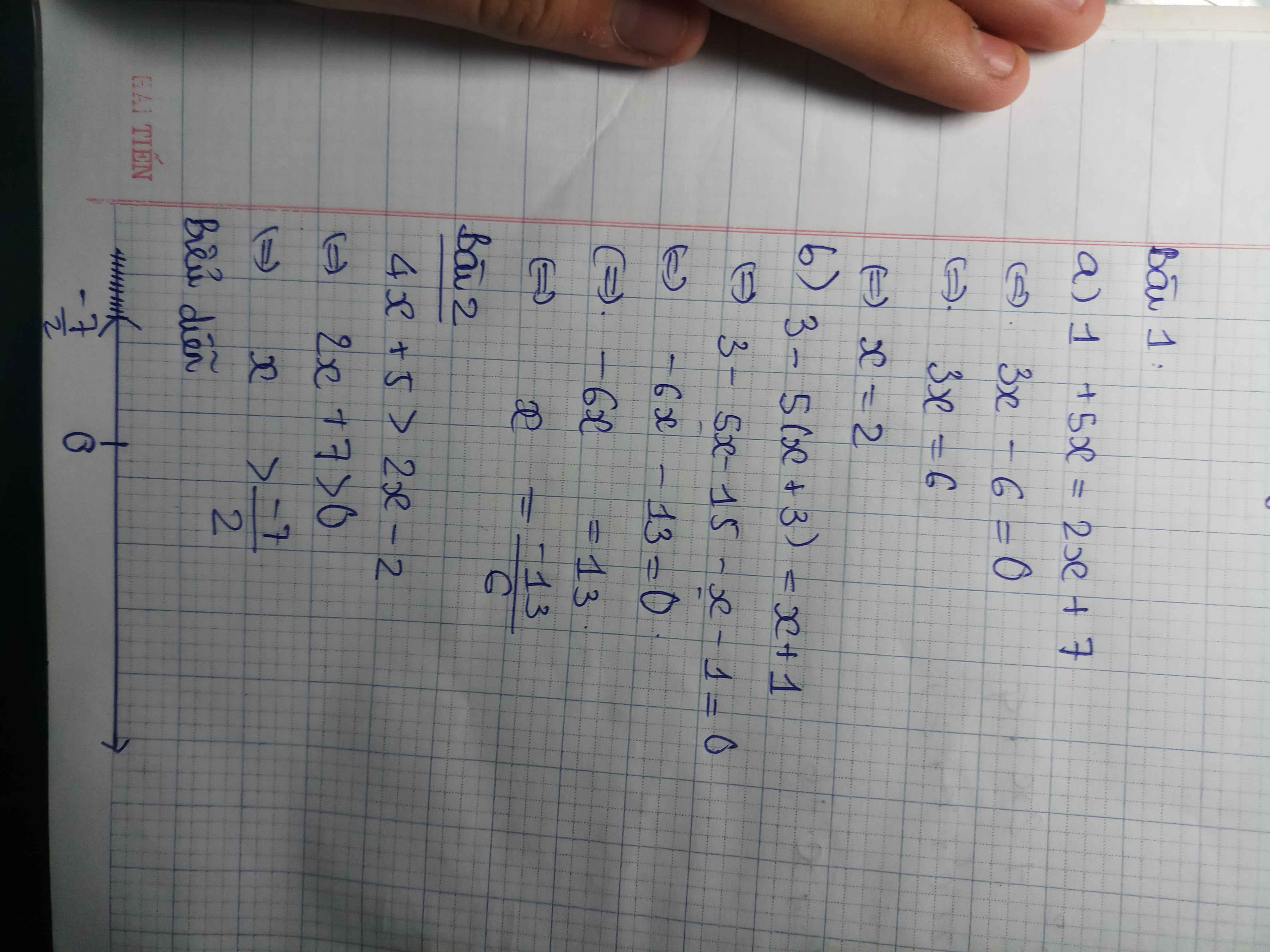Giải phương trình: a)\(x^3-4x+5\) b)\(\left(x^2-x+1\right)^4-10x^2\left(x^2-x+1\right)^2+9x^4=0\)
Hãy nhập câu hỏi của bạn vào đây, nếu là tài khoản VIP, bạn sẽ được ưu tiên trả lời.


1) Ta có: \(4x+8=3x-1\)
\(\Leftrightarrow4x-3x=-1-8\)
\(\Leftrightarrow x=-9\)
2) Ta có: \(10-5\left(x+3\right)>3\left(x-1\right)\)
\(\Leftrightarrow10-5x-15-3x+3>0\)
\(\Leftrightarrow-8x>2\)
hay \(x< \dfrac{-1}{4}\)

a/ 4x + 20 = 0
⇔4x = -20
⇔x = -5
Vậy phương trình có tập nghiệm S = {-5}
b/ 2x – 3 = 3(x – 1) + x + 2
⇔ 2x-3 = 3x -3+x+2
⇔2x – 3x = -3+2+3
⇔-2x = 2
⇔x = -1
Vậy phương trình có tập nghiệm S = {-1}
câu tiếp theo
a/ (3x – 2)(4x + 5) = 0
3x – 2 = 0 hoặc 4x + 5 = 0
- 3x – 2 = 0 => x = 3/2
- 4x + 5 = 0 => x = – 5/4
Vậy phương trình có tập nghiệm S= {-5/4,3/2}
b/ 2x(x – 3) – 5(x – 3) = 0
=> (x – 3)(2x -5) = 0
=> x – 3 = 0 hoặc 2x – 5 = 0
* x – 3 = 0 => x = 3
* 2x – 5 = 0 => x = 5/2
Vậy phương trình có tập nghiệm S = {0, 5/2}

\(a,\dfrac{x-3}{x}=\dfrac{x-3}{x+3}\)\(\left(đk:x\ne0,-3\right)\)
\(\Leftrightarrow\dfrac{x-3}{x}-\dfrac{x-3}{x+3}=0\)
\(\Leftrightarrow\dfrac{\left(x-3\right)\left(x+3\right)-x\left(x-3\right)}{x\left(x+3\right)}=0\)
\(\Leftrightarrow x^2-9-x^2+3x=0\)
\(\Leftrightarrow3x-9=0\)
\(\Leftrightarrow3x=9\)
\(\Leftrightarrow x=3\left(n\right)\)
Vậy \(S=\left\{3\right\}\)
\(b,\dfrac{4x-3}{4}>\dfrac{3x-5}{3}-\dfrac{2x-7}{12}\)
\(\Leftrightarrow\dfrac{4x-3}{4}-\dfrac{3x-5}{3}+\dfrac{2x-7}{12}>0\)
\(\Leftrightarrow\dfrac{3\left(4x-3\right)-4\left(3x-5\right)+2x-7}{12}>0\)
\(\Leftrightarrow12x-9-12x+20+2x-7>0\)
\(\Leftrightarrow2x+4>0\)
\(\Leftrightarrow2x>-4\)
\(\Leftrightarrow x>-2\)

Bài 1:
a) Ta có: \(2\left(3-4x\right)=10-\left(2x-5\right)\)
\(\Leftrightarrow6-8x-10+2x-5=0\)
\(\Leftrightarrow-6x+11=0\)
\(\Leftrightarrow-6x=-11\)
hay \(x=\dfrac{11}{6}\)
b) Ta có: \(3\left(2-4x\right)=11-\left(3x-1\right)\)
\(\Leftrightarrow6-12x-11+3x-1=0\)
\(\Leftrightarrow-9x-6=0\)
\(\Leftrightarrow-9x=6\)
hay \(x=-\dfrac{2}{3}\)

Câu 4:
Giả sử điều cần chứng minh là đúng
\(\Rightarrow x=y\), thay vào điều kiện ở đề bài, ta được:
\(\sqrt{x+2014}+\sqrt{2015-x}-\sqrt{2014-x}=\sqrt{x+2014}+\sqrt{2015-x}-\sqrt{2014-x}\) (luôn đúng)
Vậy điều cần chứng minh là đúng
2) \(\sqrt{x^2-5x+4}+2\sqrt{x+5}=2\sqrt{x-4}+\sqrt{x^2+4x-5}\)
⇔ \(\sqrt{\left(x-4\right)\left(x-1\right)}-2\sqrt{x-4}+2\sqrt{x+5}-\sqrt{\left(x+5\right)\left(x-1\right)}=0\)
⇔ \(\sqrt{x-4}.\left(\sqrt{x-1}-2\right)-\sqrt{x+5}\left(\sqrt{x-1}-2\right)=0\)
⇔ \(\left(\sqrt{x-4}-\sqrt{x+5}\right)\left(\sqrt{x-1}-2\right)=0\)
⇔ \(\left[{}\begin{matrix}\sqrt{x-4}-\sqrt{x+5}=0\\\sqrt{x-1}-2=0\end{matrix}\right.\)
⇔ \(\left[{}\begin{matrix}\sqrt{x-4}=\sqrt{x+5}\\\sqrt{x-1}=2\end{matrix}\right.\)
⇔ \(\left[{}\begin{matrix}x\in\varnothing\\x=5\end{matrix}\right.\)
⇔ x = 5
Vậy S = {5}

a: Ta có: \(\sqrt{4x^2+4x+3}=8\)
\(\Leftrightarrow4x^2+4x+1+2-64=0\)
\(\Leftrightarrow4x^2+4x-61=0\)
\(\Delta=4^2-4\cdot4\cdot\left(-61\right)=992\)
Vì Δ>0 nên phương trình có hai nghiệm phân biệt là:
\(\left\{{}\begin{matrix}x_1=\dfrac{-4-4\sqrt{62}}{8}=\dfrac{-1-\sqrt{62}}{2}\\x_2=\dfrac{-4+4\sqrt{62}}{8}=\dfrac{-1+\sqrt{62}}{2}\end{matrix}\right.\)

a: ĐKXĐ: x>=-2
\(PT\Leftrightarrow3\cdot3\sqrt{x+2}=\dfrac{1}{2}\cdot2\sqrt{x+2}+16\)
=>\(9\sqrt{x+2}-\sqrt{x+2}=16\)
=>\(8\sqrt{x+2}=16\)
=>\(\sqrt{x+2}=2\)
=>x+2=4
=>x=2
b: ĐKXĐ: \(x\in R\)
\(5+\sqrt{x^2-4x+4}=9\)
=>\(\left|x-2\right|=4\)
=>x-2=4 hoặc x-2=-4
=>x=6 hoặc x=-2


a) Thiếu đề nha !!!!!!
b)
Đặt: \(\left(x^2-x+1\right)^2=a;x^2=b\)
=> TA CÓ PT MỚI SAU: \(a^2-10ab+9b^2=0\)
<=> \(a^2-ab-9ab+9b^2=0\)
<=> \(\left(a-b\right)\left(a-9b\right)=0\)
<=> \(\orbr{\begin{cases}a=b\\a=9b\end{cases}}\)
TH1: \(a=b\)
=> \(\left(x^2-x+1\right)^2=x^2\) \(\)
<=> \(\orbr{\begin{cases}x^2-x+1=x\\x^2-x+1=-x\end{cases}}\)
<=> \(\orbr{\begin{cases}x^2-2x+1=0\\x^2+1=0\end{cases}}\)
<=> \(\orbr{\begin{cases}\left(x-1\right)^2=0\\do:x^2\ge0\forall x\end{cases}}\)
=> \(\orbr{\begin{cases}x=1\\x^2+1\ge1>0\end{cases}}\)
=> pt: \(x^2+1=0\) vô nghiệm.
TH2: \(a=9b\)
=> \(\left(x^2-x+1\right)^2=9x^2\)
<=> \(\orbr{\begin{cases}x^2-x+1=3x\\x^2-x+1=-3x\end{cases}}\)
<=> \(\orbr{\begin{cases}x^2-4x+1=0\\x^2+2x+1=0\end{cases}}\)
<=> \(\hept{\begin{cases}x=2+\sqrt{3}\\x=2-\sqrt{3}\\x=-1\end{cases}}\)
VẬY TẬP HỢP NGHIỆM CỦA PT LÀ: \(S=\left\{1;-1;2+\sqrt{3};2-\sqrt{3}\right\}\)
Câu a thiếu =0 nhé